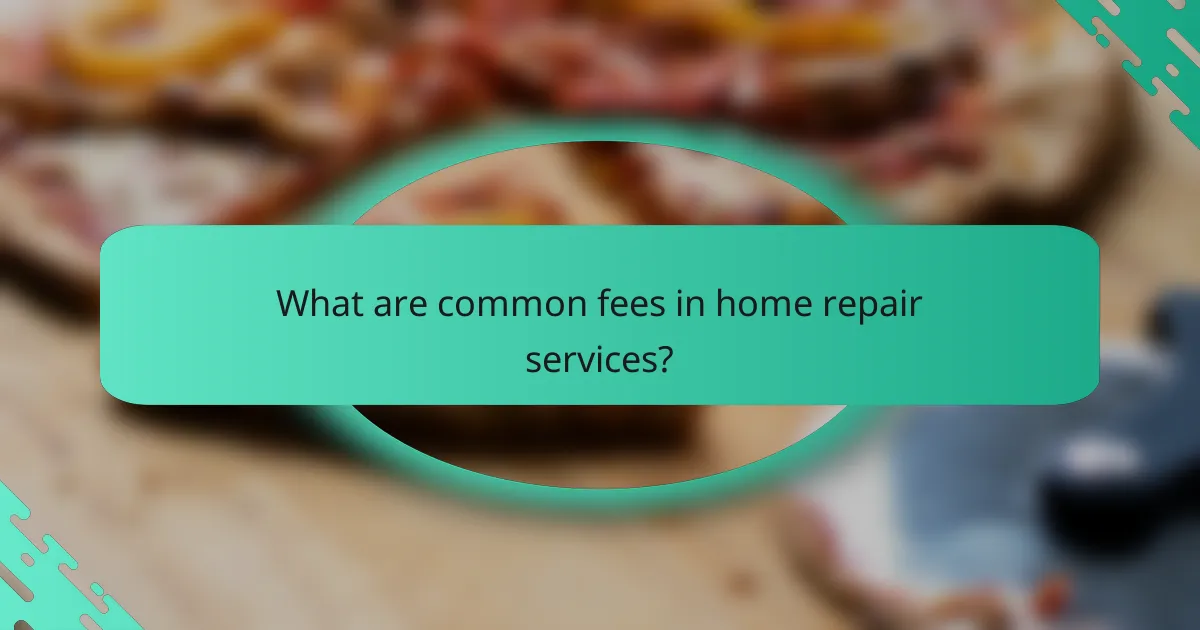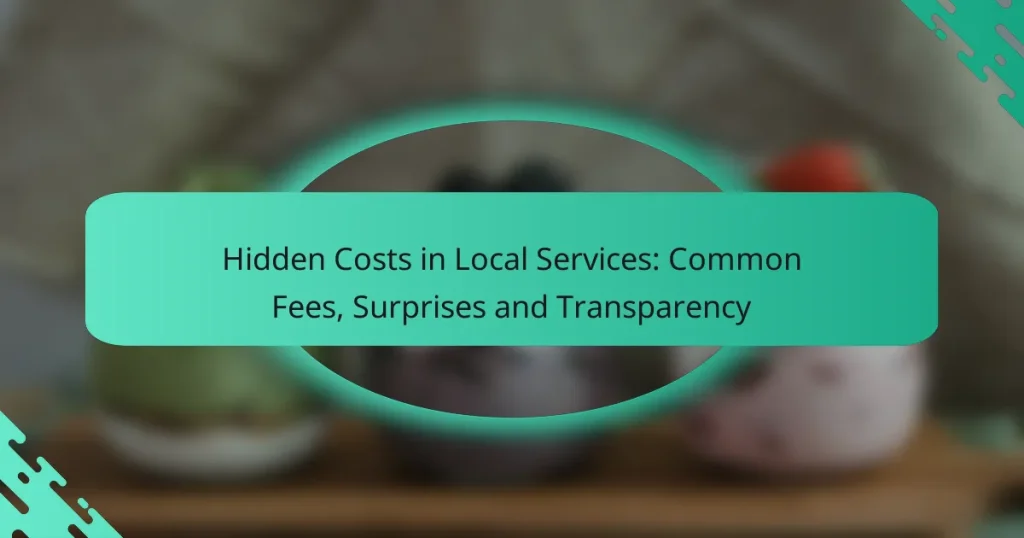Hidden costs in local services can lead to unexpected expenses that significantly inflate your overall budget. Common fees, such as service charges, travel costs, and permit fees, are often not clearly disclosed in initial quotes. By proactively gathering information about these potential costs, you can make informed decisions and avoid unpleasant financial surprises.

What hidden costs should I expect in local services?
Hidden costs in local services can significantly increase your overall expenses. Common fees include service charges, travel costs, material expenses, permit fees, and disposal charges, which may not be clearly outlined in initial quotes.
Service fees
Service fees are additional charges that service providers may apply for their expertise or administrative costs. These fees can vary widely depending on the type of service, ranging from a flat rate to a percentage of the total cost. Always ask for a breakdown of these fees before agreeing to a service.
For example, a plumbing service might charge a base fee for the visit, plus an hourly rate for labor. Understanding these fees upfront can help you budget more accurately.
Travel charges
Travel charges are fees that cover the cost of getting to your location. These can be particularly relevant for services that require technicians to travel long distances. Depending on the provider, travel fees might be a flat rate or calculated based on distance.
In urban areas, travel charges may be lower due to proximity, while rural locations could incur higher fees. Always confirm whether travel charges apply and how they are calculated.
Material costs
Material costs refer to the expenses associated with the supplies needed for the service. These can include anything from parts for repairs to cleaning supplies for maintenance. Providers may mark up these costs, so it’s wise to inquire about the pricing structure.
For instance, if a contractor is repairing your roof, they might charge you for shingles at a higher rate than retail. Requesting a list of materials and their costs can help you avoid surprises.
Permit fees
Permit fees are charges for obtaining necessary legal permissions to perform certain services, especially in construction or renovation projects. These fees can vary based on local regulations and the scope of the work being done.
In some areas, failing to secure the proper permits can lead to fines or additional costs. Always check with your service provider about any required permits and their associated fees before starting a project.
Disposal fees
Disposal fees are costs related to the removal and disposal of waste generated during a service. Many providers include these fees in their estimates, but some may charge them separately, especially for large projects like renovations or landscaping.
For example, if you’re having old furniture removed, the service might charge a disposal fee based on weight or volume. Clarifying these fees can prevent unexpected charges on your final bill.

How can I avoid surprises in pricing?
To avoid surprises in pricing for local services, it’s essential to be proactive in gathering information upfront. Understanding the full scope of costs can help you make informed decisions and prevent unexpected charges.
Request detailed estimates
Always ask for a detailed estimate before committing to any service. A comprehensive estimate should break down labor, materials, and any other costs involved, allowing you to see where your money is going.
For example, if hiring a contractor, request an itemized list of materials and labor rates. This transparency helps you compare different service providers effectively and spot any discrepancies.
Ask about additional fees
Inquire specifically about any additional fees that may apply to the service. Common hidden costs include travel fees, disposal fees, or charges for emergency services that can significantly increase your total bill.
For instance, if you are hiring a plumber, ask if there are extra charges for after-hours service or if they charge a flat fee for travel. Knowing these details upfront can save you from unexpected expenses.
Review contracts carefully
Before signing any contract, take the time to read it thoroughly. Look for clauses that mention potential extra charges or fees that could apply under certain conditions.
Pay attention to the fine print, as it often contains important information about payment terms, cancellation policies, and warranty conditions. If anything is unclear, don’t hesitate to ask for clarification to ensure you fully understand your financial obligations.

What are common fees in home repair services?
Common fees in home repair services can significantly impact the overall cost of a project. Understanding these fees helps homeowners budget effectively and avoid unexpected expenses.
Labor costs
Labor costs typically account for a large portion of home repair expenses. Rates can vary widely based on the type of service, location, and the contractor’s experience, often ranging from $50 to $150 per hour. It’s essential to get multiple quotes to ensure you are paying a fair rate.
Additionally, some contractors may charge a flat fee for specific jobs, which can be more economical for straightforward repairs. Always clarify whether the quoted price includes labor and materials to avoid surprises.
Emergency service fees
Emergency service fees apply when repairs are needed outside of regular business hours. These fees can be significantly higher, sometimes 1.5 to 2 times the standard rate, reflecting the urgency and inconvenience of the service. Homeowners should inquire about these rates upfront, especially if they anticipate needing urgent repairs.
It’s advisable to establish a relationship with a reliable service provider before emergencies arise, as this can sometimes lead to more favorable pricing or quicker response times.
Inspection fees
Inspection fees are charged for assessing the condition of a home or specific systems, such as plumbing or electrical. These fees can range from $100 to $500, depending on the complexity of the inspection and the size of the property. Knowing the inspection costs upfront can help homeowners budget effectively.
Some contractors may waive inspection fees if you proceed with repairs through them, so it’s worth asking about this possibility. Always ensure that the inspector is licensed and has good reviews to avoid potential issues down the line.

How do local regulations affect service pricing?
Local regulations significantly influence service pricing by imposing specific requirements and fees that businesses must adhere to. Understanding these regulations can help consumers anticipate additional costs and make informed decisions when hiring local services.
Permit requirements
Many local services require permits to operate legally, which can add to the overall cost. For instance, contractors may need building permits, while food service businesses often require health permits. These permits can range from a few dozen to several hundred dollars, depending on the type of service and local jurisdiction.
It’s essential to verify whether the service provider has obtained the necessary permits before proceeding. Hiring an unlicensed provider can lead to fines or additional costs if the work needs to be redone to meet regulatory standards.
Tax implications
Taxes can also affect the pricing of local services, as many areas impose sales tax on service transactions. This tax typically ranges from 5% to 10%, depending on the state or municipality. Some services, like home repairs or landscaping, may be exempt from sales tax, while others are not.
Consumers should inquire about tax implications upfront to avoid surprises in the final bill. Additionally, understanding any applicable local tax incentives or deductions can help reduce overall costs when hiring services.

What are the best practices for ensuring transparency?
To ensure transparency in local services, prioritize clear communication and establish written agreements. These practices help prevent misunderstandings and hidden costs, fostering trust between service providers and clients.
Clear communication
Clear communication is essential for transparency in local services. Service providers should openly discuss all potential costs, including any fees that may arise during the service process. This upfront dialogue can help clients make informed decisions and avoid surprises.
Regular updates throughout the service process can also enhance transparency. For instance, if a service takes longer than expected or additional costs arise, promptly informing the client can mitigate frustration and build trust.
Written agreements
Written agreements serve as a crucial tool for ensuring transparency in local services. These documents should outline the scope of work, pricing, and any additional fees that may apply. Having a clear contract helps both parties understand their responsibilities and expectations.
When drafting a written agreement, include specific details such as payment terms and timelines. This clarity can prevent disputes and ensure that clients are fully aware of what they are agreeing to, reducing the likelihood of unexpected costs.


